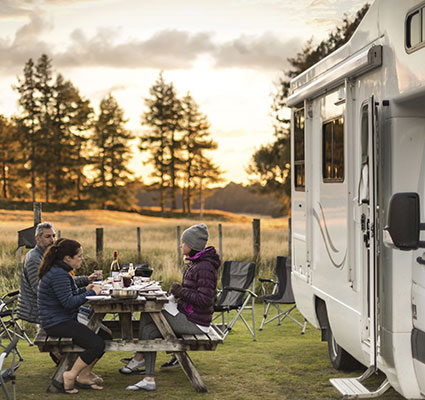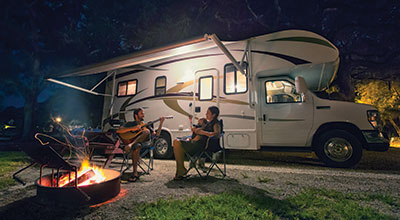Your guide to RVs

More and more people in Quebec are falling in love with the freedom and comfort of vacationing in a recreational vehicle. But before you jump in the driver’s seat, here’s what you need to know.
How to choose the right RV
Buying a recreational vehicle is a major investment that you don’t want to undertake blindly. Before you begin your search, talk to an expert who can help you figure out what’s most important to you. What’s your budget? How do you plan to use your RV and how often? Will you need to buy a car with greater towing capacity? You need to ask the right questions to identify the right vehicle for you.
Buying an RV: What to consider when setting your budget
There are so many different models of RV on the market, you have options galore. The bigger the vehicle, the more expensive it will be to maintain and store during the winter. Prices vary with the type of vehicle, of course, but total space, number of beds, maximum load, and any accessories it comes with (bike rack, air conditioning, backup battery, etc.) also come into play. When working out your budget, remember the cost of maintenance, gas, and insurance, plus the bedding, table linens, dishes, utensils, and other homewares you’ll need to buy to make your RV a place you can live every day. Maintenance for a trailer is generally less expensive than for a motorized RV, whose mechanical parts tend to drive up costs.
There’s an RV for everyone
Recreational vehicles come in two categories:
1) Motorized RVs
Also called motorhomes, they come in three classes:
- Class A (motorhome built on a heavy or commercial truck, or a bus)
- Class B (called a “camper van,” with a raised roof added onto a conventional van)
- Class C (built on a sturdy truck chassis with a cabin that doubles as living quarters)
2) Towable RVs
This category includes a variety of trailer models:
- Travel trailer
- Fifth-wheel trailer
- Pop-up (tent/folding) camper
- Truck camper
- Hybrid travel trailer (or hybrid camper)

Try renting!
If you can’t decide, try renting a recreational vehicle, which has its own benefits. Whether you want to explore the RV lifestyle with a trailer or a luxury motorhome, actually using it for a few days will give you a better idea of what you really want and need.
Figure out how much you can tow
If you decide to go with a trailer, you’ll need to make sure your vehicle is up to towing it. You’ll find the towing capacity of your car, SUV, minivan, or pickup truck in the owner’s manual. But watch out. You need to consider the weight of the trailer AND what’s in it (including your luggage). CAA-Quebec’s Automotive Advisory Services can help you do the math.
Estimate your fuel expenses
It won’t come as a surprise that the bigger the vehicle, the more gas it uses. RVs guzzle an average of 12 to 30 litres of gas every 100 kilometres. Tip: You can reduce your fuel consumption if you travel light, take it a little slower, and try to find routes with as few hills as possible
Interested in a used RV?
Make sure the one you’re looking at does not have a history of water leaks. If so, you’ll want to be sure the issue was repaired to spec. Check the condition of the shades and awnings. For peace of mind, get the vehicle inspected by a mechanic you trust.
Travelling in an RV: What you need to know before you leave
Are you the new owner of a recreational vehicle? Don’t forget these important steps to protect your new purchase.
What to check when taking your RV out of storage
When prepping your RV for the summer, it is important to make sure everything is ship shape and there is no damage or sign of water infiltration. To cover all the bases, follow our 10-step guide on taking your RV out of storage.
Maintain it scrupulously
To avoid unexpected road trouble, follow your RV maintenance guide to the letter (oil changes, coolant, brakes about every 6,000 to 7,000 km, and the battery). Check your lights and signals regularly and make sure all panels are watertight to prevent destructive leaks, et entretenez les accessoires (chauffe-eau, auvent électrique, climatiseur, etc.) avec minutie. Get your vehicle inspected every year and protect it from harsh winter conditions.
Get the right tires for your RV
Tires for travel trailers are different than tires for motorized vehicles. They have a more flexible tread and brush across the road surface on curves. Motor vehicle tires are designed for comfort and to grip the road on turns. Get more info from your CAA-Quebec-recommended tire dealer. Check your owner’s manual for the right tire pressure for your tires. Watch for signs of wear (among the most common causes of accidents) and don’t keep them for more than six years.
Tip:
Check your tire pressure each time you stop at a service station. A properly inflated tire is more fuel efficient.
Choose the right insurance coverage
You are required by law to insure your vehicle with a minimum of $50,000 in civil liability coverage. Insurers actually recommend you opt for coverage of $1 million, or $2 million if you are travelling outside Quebec. That way you’ll be adequately protected in the event of damage to your RV (collision, property damage, bodily injury to others). Don’t forget to insure the property you’re carrying inside your vehicle as well and to take out travel insurance if you are planning to venture outside the province. Last but not least, choose a roadside assistance service like CAA-Quebec’s CAA Plus RV, which will make things so much easier if you do break down. Oh and you still need insurance if you decide to rent an RV.
Our tips for planning your RV vacation

There are so many places you can go and ways to use your RV. Whatever destination you choose, planning is key. Here are few details you should figure out ahead of time since they can turn into big headaches:
- Where can you empty sewage and wastewater? Keep an eye on the fill level indicated on the monitor panel. Tip: Empty blackwater before greywater. The soapy water will help sluice out the sewer hose.
- Where can you legally park your vehicle?
- Does your route include roads where RVs aren’t allowed?
- What campsites can accommodate your motorhome or trailer, provide the services you need, and offer activities you enjoy?
With the TripTik® Planner, you can create your own personalized itinerary online. CAA-Quebec experts can provide you with road maps, assist you in renting a vehicle, and make recommendations for activities along the way.
You might also consider picking up these outdoor essentials from the CAA-Quebec Boutique and packing them in your suitcase or RV:
- Walkie-talkies
- Fridge and cupboard retainer bars
- Environmentally friendly firestarters
- Handheld vacuum
- Retractable clothesline
- Mosquito repellent and citronella candles
- Toilet and wastewater tank treatments
- Toilet paper for RVs
Do your part to keep the roads safe
Driving a motorhome or towing a trailer requires a few adjustments. Remember:
- Don’t drive too fast: The weight of the trailer requires much more braking time.
- Always maintain a safe distance between your vehicle and the one in front of you.
- Maintain an appropriate speed: Trailers are large, which makes them very sensitive to the wind.
- Slow down gently when approaching bends in the road and avoid braking hard. You should drive at a steady pace.
- Watch out for blind spots, which are bigger with a big vehicle. When drivers are passing you, you may not see them the whole time.
- Take note of traffic signs and know how tall and wide your trailer is.
- Not used to driving a vehicle with a trailer? Sign up for a special driving course and you’ll become a real pro!
Need advice regarding your vehicle or want to upgrade your membership?

Benefit from personalized advice
Electric or gas-powered cars, RVs, ATVs or motorcycles
Enhance your experience
Switch to the card that best suits your needs.